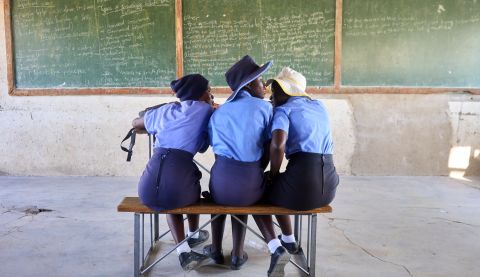A failed opportunity for transformative macroeconomic governance
27 June 2025
After a long road of negotiations, the Fourth International Conference on Financing for Development (FFD4) starts next week in Seville. While global leaders have had a chance to stand with the ongoing calls by civil society organisations and feminist movements long advocating for a fair global economic system, the outcome of the process and the document itself leaves much to be desired, particularly from the influence of global north countries such as the UK. As a result, calls by civil society and Global South countries have been watered down.

Ongoing intersecting crises disproportionately affect women and girls in their diversity across the Global South. Resource mobilisation is greatly impacted by the climate crisis, the human and environmental costs of profit driven economies, losses in tax revenues and heavy debt burdens. New research by ActionAid shows that 86% of all low and lower-middle income countries are in, or at a significant risk of, a debt crisis. Moreover, the imbalance of global power enables the external debts of lower income countries to be brutally enforced whilst the climate debts of rich countries go largely unpaid and unenforced. The unfair debt burden shouldered by the Global South is used to justify intensified rounds of austerity by institutions that are undemocratic, unrepresentative and unaccountable.
Within this context, cuts to official development assistance (ODA) globally have been particularly devastating. They can be seen as part of heightened backlash against the rights of women and girls, at a time of deepening debt and austerity crises in many countries in the Global South. FFD4 is an opportunity for Member States to achieve transformative change for women and girls in the Global South by listening to the ongoing demands of Women’s Rights Organisations (WROs) and feminist movements through the Feminist Workstream of the Civil Society Mechanism of FFD. Member States must support gender-just macroeconomic policies that prioritise the wellbeing of humans and the planet and end years of sustained underinvestment, cuts to vital public services and long-standing social inequalities.
The UK Government (UKG) has the opportunity to demonstrate progressive leadership at FFD, allyship with the ongoing calls of WROs and commitment to women and girls in the Global South. Here are some of the main issues it should be looking at:
1. Issues of debt are not gender neutral
The impacts of debt are deeply gendered because of the ways in which economic structures, social norms, and systemic inequalities disproportionately affect women in their diversity, particularly those from historically marginalised communities. Debt often results in austerity measures, which reduce funding for public services like healthcare, education, and social protection programmes. These cuts disproportionately affect women, who rely more on public services for their employment, wellbeing and care services.
For example, women are more likely to work in the public sector and to find decent work in areas such as education, healthcare and social services. These sectors are often targeted during austerity measures, meaning women, who are more often on short-term contracts than men, are the first to lose their jobs when budgets are cut. Cuts to healthcare services and social safety nets (such as mental and maternal health services, gender-based violence support, and housing assistance) - which tend to be cut first - often hit women harder as they are more likely to rely on these services.
New research by ActionAid highlights how, over the last five years, austerity measures in six African countries have led to the deterioration of public health and education services. 84% of all teachers surveyed reported a drop in real income of between 10% and 50% since 2020, while 97% of health workers described their wages as insufficient to cover rent, food and household expenses.
Feminist movements from the Global South, including those leading and participating in the Feminist Working Group of the Civil Society Mechanism of FFD4, have long called for the impacts of debt on women and those facing intersecting forms of marginalisation to be recognised. They are calling for the advancement of a human-rights-centred, decolonial debt architecture that allows countries to sustainably borrow and invest in sustainable development and the realisation of human rights.
2. Where is the money for meaningful transformation?
Domestic public resources are essential for funding quality public services and addressing gender inequality. Taxation is the main way governments raise these funds, however, in many Global South countries, global economic structures prevent tax systems from being effective or equitable, including for example regressive tax treaties the UKG has with countries like Malawi.
International financial institutions such as the International Monetary Fund (IMF) often promote regressive tax policies as part of their macroeconomic advice and loan conditionalities. These forms of taxation (such as value added taxes) place a heavier burden on low-income communities, especially women and girls, while allowing corporations and wealthy elites to avoid their fair share of overall taxes. This creates more space for illicit financial flows, tax evasion, and the use of tax havens, all of which deprive countries of critical revenue needed to meet people’s rights and redistribute wealth.
These external pressures are made worse by the gendered nature of tax systems themselves. Many national tax structures are not only regressive but also uphold both implicit and explicit gender biases. Women often bear an unequal share of the tax burden, while at the same time receiving fewer benefits from public spending due to cuts and underinvestment in sectors that support care, health, and education.
Meanwhile, global tax rules have historically been written by a handful of powerful countries – largely through the OECD, G7, and G20 – with little to no input from countries in the Global South. This power imbalance undermines transparency, equity, and inclusive decision-making. Feminist movements and Global South advocates welcome the work of African nations at the United Nations (UN) General Assembly which has been key to the progress now being made towards a UN Framework Convention on International Tax Cooperation (UN FCITC), which will be a step toward a more democratic and just global tax system. ActionAid calls on States not to use the FFD process to undermine this progress and instead to endorse the Terms of Reference for the UN FCITC and commit to engaging constructively and in good faith in the negotiations.
3. There is no climate justice without debt justice
It is calculated that high-income countries in the Global North have achieved up to 70% of their economic growth by appropriating more than their fair share of the ‘atmospheric commons’. Based on the lowest estimates, the ‘climate debt’ that polluting countries are liable to pay to climate-vulnerable low- and lower-middle income countries is US$ 107 trillion. This is more than 70 times greater than the total external debt of US$ 1.45 trillion that these countries collectively owe. However, due to the global imbalance of power, the climate debts of historically polluting Global North countries go largely unpaid and unenforced while the external debts of lower income countries are relentlessly enforced.
Moreover, the external debts of lower income countries actively serve to accelerate the climate crisis. Debt locks countries into a negative spiral – forcing governments to shape their economies and societies to pay back their debts in foreign currencies, further harming the climate in the process. In the present global economy, this leads to more extraction of fossil fuels, more mining, more chemical-based industrial agriculture for export, more deforestation, and more environmental destruction, wreaking untold harm on human rights, particularly the rights of women and girls. Women and girls also face the highest costs of climate impacts when governments don’t have the funds to adapt and respond to increasing emergencies.
4. The need for an overhaul of the international financial architecture
The clock is ticking, there is no time for band aid solutions! The IMF continues to enforce austerity policies that are little changed from their discredited Structural Adjustment Programmes of the 1980s. The IMF is still reluctant to acknowledge the scale of the debt crisis or to recognise that systemic global forces generate and perpetuate debt crises. This has a severely disproportionate impact on women and girls for the multiple and intersecting reasons outlined above.
The IMF’s failure to acknowledge the debt crisis as systemic is a direct result of its powerful shareholders (global north countries) exerting their influence. As such, this is a failure of governance. This is the consequence of an outdated institution, designed in the colonial era, setting economic governance rules that are not fit for purpose to resolve a twenty-first century crisis. FFD4 offers an opportunity to recognise the failure of the present colonial debt architecture and push for a new Debt Convention based on equity, inclusivity, participation, accountability and transparency.
We stand with WROs and feminist movements voicing their demands through the Civil Society mechanism and its feminist workstream. ActionAid calls on the UKG to use FFD4 to live up to its commitments to women and girls and to building trusted partnerships with Global South countries, by pushing for transformative macroeconomic policies to reform the international financial architecture. Governments need to agree to uphold the rights of all women and girls and get rid of outdated economic systems and rules that are underpinned by women and girls disproportionate and invisible unpaid care and domestic work burden. Feminist economic alternatives need to be at the centre of the transformation, not in the margins.
You can support ActionAid and the work we do, both in advocacy and providing aid, by donating today.
